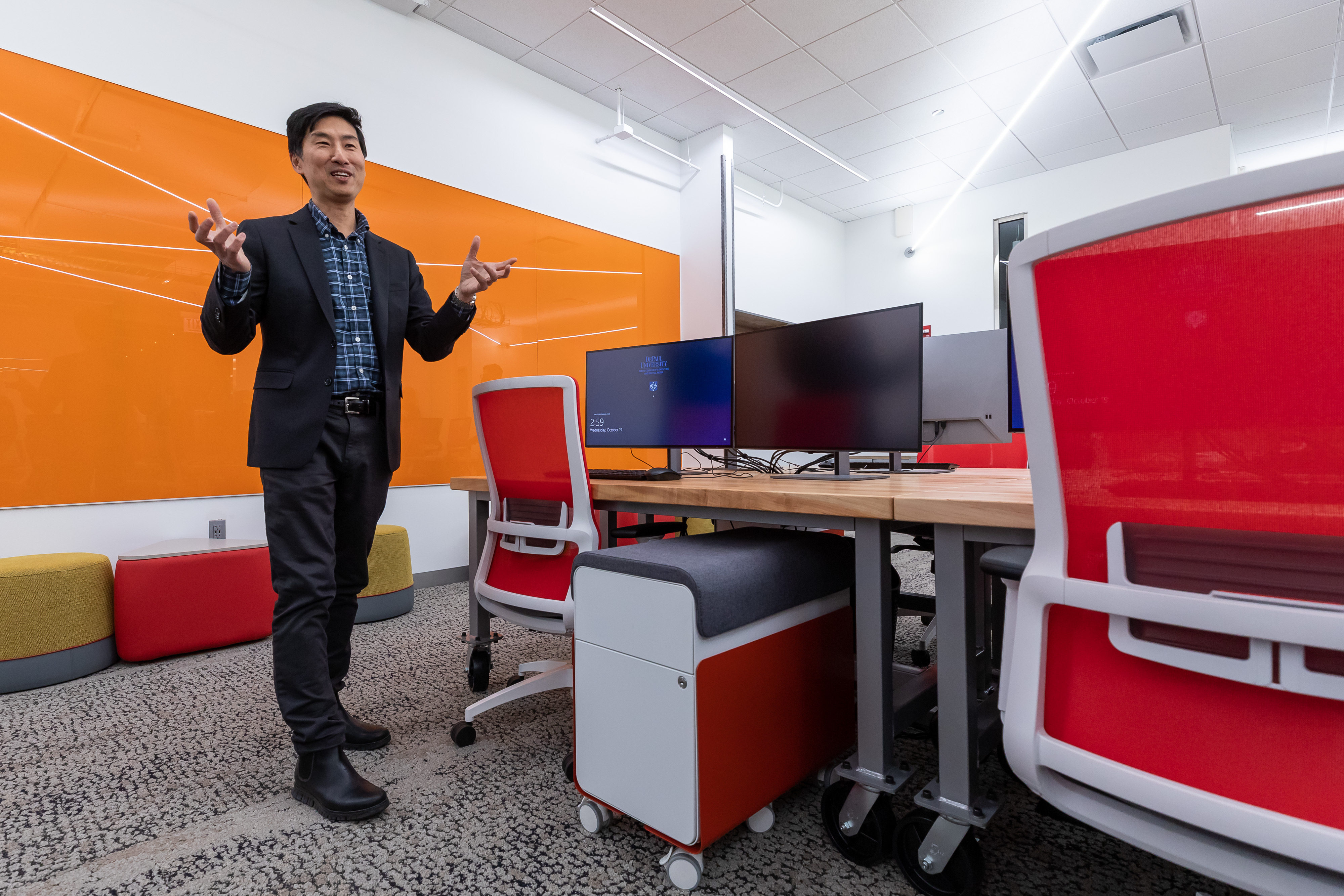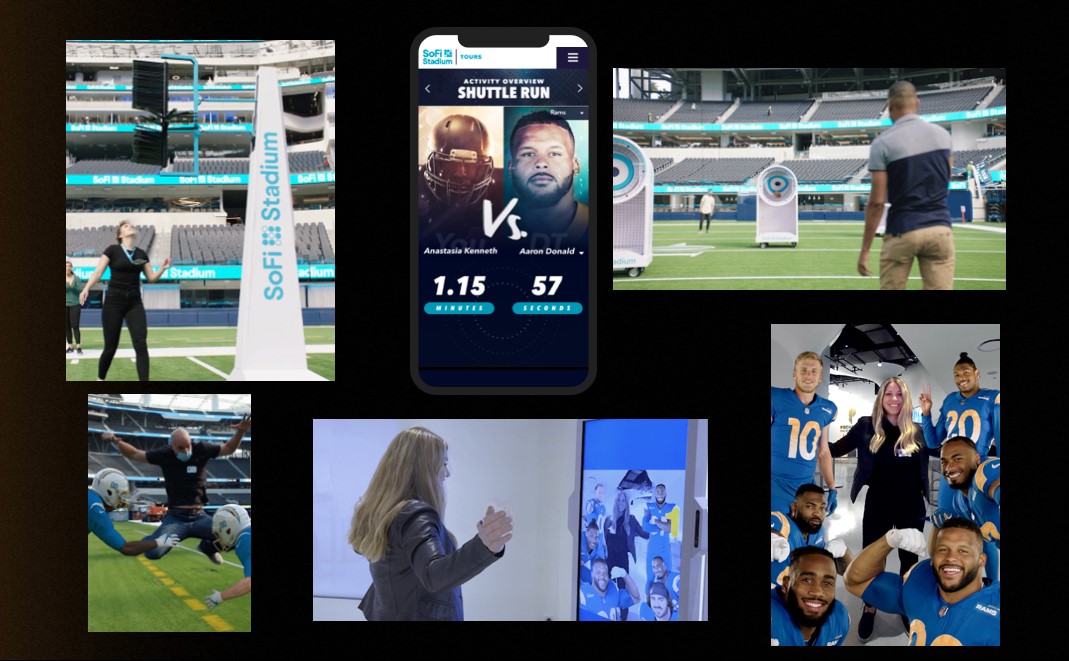 Josh Tsui gives a tour of the Jarvis Student Center for Innovation and Collaboration. A filmmaker, game developer and experiential designer, Tsui is the first director of innovation at CDM. (DePaul University/Jeff Carrion)
Josh Tsui gives a tour of the Jarvis Student Center for Innovation and Collaboration. A filmmaker, game developer and experiential designer, Tsui is the first director of innovation at CDM. (DePaul University/Jeff Carrion) As a young game developer in the 1990s, Josh Tsui worked on the teams behind the classic games Mortal Kombat and NBA Jam in scrappy Chicago-based studios. During his career, he has opened his own game design studios, produced a documentary film, and designed live experiences for some of the biggest stadiums in the U.S.
Still, a desire to give back and reconnect with students called to Tsui.
“Right out of college I taught a course called Computer Graphics and Video. It was a new technology, and I learned so much from the students,” Tsui says. “They would bring up scenarios I’d never thought about, and we would have to figure it out together.”
He joined DePaul earlier this year as the first director of innovation in the Jarvis College of Computing and Digital Media. In his new role, he leads the Jarvis Student Center for Innovation and Collaboration, a newly opened hub for technology and gathering on DePaul’s Loop Campus. Tsui says the center will be an incubator for student and faculty design, animation, filmmaking, computing and more.
“The more diversity we get together here across disciplines, the more likely it is happy accidents of innovation will happen,” Tsui says. “The space is very open and almost lounge-like, which will make it a lot easier to break down silos.”
Silos don’t seem to be a problem for Tsui, who has crisscrossed several industries in his own career. “I’ve gone from being an artist all the way up to owning a studio, and everything in between,” he says.
As an undergraduate, Tsui studied filmmaking in Chicago but was drawn into the burgeoning video game scene in the city. He worked in several studios and then cofounded his own, Robomodo Studio, in 2008. Tsui worked on famous game franchises from WWE WrestleMania to Tony Hawk, developing technology along the way from a skateboard controller to early VR headsets.
As he rose in the ranks, he took notice of DePaul’s academic programs in game development. “It always stuck with me how prepared DePaul students were when they interned at Robomodo. I was impressed by the level of their work and professionalism.”
In 2016, Tsui returned to his filmmaking roots as director and producer of the documentary “Insert Coin,” which dips back into the world of his early career. The film is an oral history of “the team of geeks and misfits” who created Mortal Kombat, NBA Jam and other famous video games. It was selected by the prestigious South by Southwest film festival in 2020 and has screened across the country.
“Three of the biggest games in history were all made by the same people in Chicago,” Tsui says. One of those people is Eugene P. Jarvis, the innovator and donor whose generous gift made the new center possible.
With the film wrapped, Tsui crossed into a new sector and began working in experiential design. The SoFi Stadium in Los Angeles cost nearly $5 billion to construct, and Tsui’s firm was tasked with creating a tour and effects to draw visitors to check out the space.
 Josh Tsui was part of the team that designed the tour experience for SoFi Stadium in the Los Angeles area. A tunnel run, mobile app and selfies with virtual players are all part of the tour. (Images courtesy of Josh Tsui)
Josh Tsui was part of the team that designed the tour experience for SoFi Stadium in the Los Angeles area. A tunnel run, mobile app and selfies with virtual players are all part of the tour. (Images courtesy of Josh Tsui)“We created a multimedia experience with videos, smoke and fog. Guests get to run through the tunnel to blaring music out onto the field and pretend they’re NFL All-Stars,” he says. They also customized machines for throwing targets, field goals, and even footballs with chips that can output data on distance. He also created a concept for an immersive, 360 theater in the One World Trade Center observatory in New York.
“That work combined all my interests and added something new, the physical installations,” Tsui says. Looking ahead, Tsui is energized by the possibilities for cutting-edge work in the Jarvis Student Center. With commercial work, Tsui says there are time constraints and client expectations, but those limits don’t apply to students and faculty who have the energy and time to think bigger.
“Working across all three schools within CDM, there is so much potential for research and experimentation. Already I can see some incredible things coming together here at DePaul.”
For more, visit the Jarvis Student Center online.